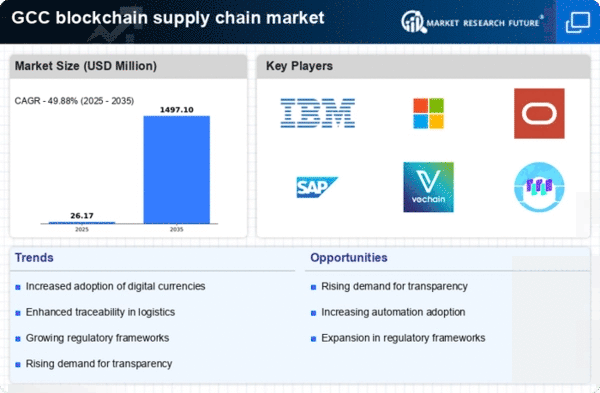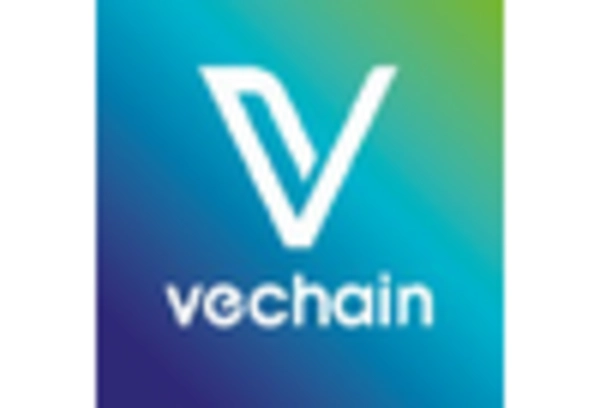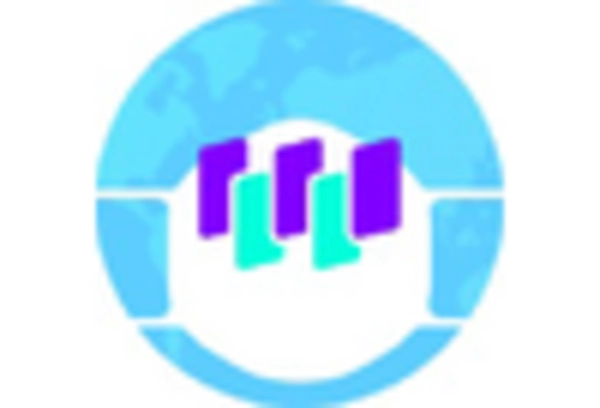Rising Demand for Transparency
The blockchain supply chain market is experiencing a notable surge in demand for transparency among stakeholders. In the GCC region, consumers and businesses alike are increasingly prioritizing visibility into the supply chain processes. This trend is driven by the need to ensure product authenticity and traceability, particularly in sectors such as food and pharmaceuticals. According to recent data, approximately 70% of consumers in the GCC express a preference for brands that provide clear information about their supply chains. This heightened demand for transparency is compelling companies to adopt blockchain technology, which offers immutable records and real-time tracking capabilities, thereby enhancing trust and accountability within the blockchain supply-chain market.
Government Initiatives and Support
Government initiatives in the GCC are playing a pivotal role in the growth of the blockchain supply chain market. Various national strategies are being implemented to promote digital transformation and innovation across industries. For instance, the UAE government has launched the Emirates Blockchain Strategy 2021, aiming to leverage blockchain technology to enhance efficiency and reduce costs in supply chains. This initiative is expected to save the UAE economy approximately $3 billion annually by streamlining processes. Such supportive policies are likely to encourage businesses to invest in blockchain solutions, thereby accelerating the adoption of blockchain technology within the supply-chain market.
Integration of IoT with Blockchain
The integration of Internet of Things (IoT) technology with blockchain is emerging as a significant driver for the blockchain supply chain market. In the GCC, the proliferation of IoT devices is facilitating real-time data collection and monitoring throughout the supply chain. This synergy allows for enhanced automation and efficiency, as IoT devices can provide critical data that blockchain systems can securely record and verify. It is estimated that the combination of IoT and blockchain could reduce operational costs in supply chains by up to 30%. As businesses in the GCC recognize the potential of this integration, the blockchain supply-chain market is likely to witness accelerated growth.
Increased Focus on Regulatory Compliance
Regulatory compliance is becoming increasingly crucial for businesses operating within the blockchain supply chain market. In the GCC, governments are establishing stricter regulations to ensure safety, quality, and ethical practices in supply chains. Companies are now required to demonstrate compliance with these regulations, which often necessitates the adoption of advanced technologies like blockchain. By providing a transparent and tamper-proof record of transactions, blockchain technology can help businesses meet regulatory requirements more effectively. This focus on compliance is expected to drive investment in blockchain solutions, as companies seek to mitigate risks associated with non-compliance and enhance their operational integrity.
Growing Interest in Decentralized Finance (DeFi) Solutions
The growing interest in decentralized finance (DeFi) solutions is influencing the blockchain supply chain market in the GCC. As businesses explore innovative financing options, DeFi platforms are emerging as viable alternatives to traditional banking systems. These platforms enable companies to access funding and manage transactions without intermediaries, thereby reducing costs and increasing efficiency. The potential for DeFi to streamline financial processes within supply chains is attracting attention, with estimates suggesting that the DeFi market could reach a valuation of $800 billion by 2025. This trend is likely to encourage more businesses in the GCC to adopt blockchain technology, further propelling the growth of the blockchain supply-chain market.
















